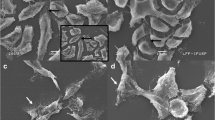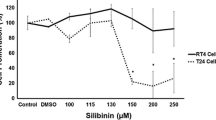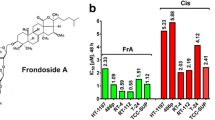Abstract
Purpose
In search for more effective clinical protocols, the antimetabolite drug 5-fluorouracil (5-FU) has been successfully included in new regimens of bladder cancer combination chemotherapy. In the present study, we have investigated the effects of 5-FU treatment on apoptosis induction in wild-type and mutant p53 urinary bladder cancer cells.
Methods
We have used MTT-based assays, FACS analysis, Western blotting and semi-quantitative RT-PCR in RT4 and RT112 (grade I, wild-type p53), as well as in T24 (grade III, mutant p53) and TCCSUP (grade IV, mutant p53) human urinary bladder cancer cell lines.
Results
In the urothelial bladder cancer cell lines RT4 and T24, 5-FU-induced TS inhibition proved to be associated with cell type-dependent (a) sensitivity to the drug, (b) Caspase-mediated apoptosis, (c) p53 stabilization and activation, as well as Rb phosphorylation and E2F1 expression and (d) transcriptional regulation of p53 target genes and their cognate proteins, while an E2F-dependent transcriptional network did not seem to be critically engaged in such type of responses.
Conclusions
We have shown that in the wild-type p53 context of RT4 cells, 5-FU-triggered apoptosis was prominently efficient and mainly regulated by p53-dependent mechanisms, whereas the mutant p53 environment of T24 cells was able to provide notable levels of resistance to apoptosis, basically ascribed to E2F-independent, and still unidentified, pathways. Nevertheless, the differential vulnerability of RT4 and T24 cells to 5-FU administration could also be associated with cell-type-specific transcriptional expression patterns of certain genes critically involved in 5-FU metabolism.











Similar content being viewed by others
References
Adamsen BL, Kravik KL, Clausen OP, De Angelis PM (2007) Apoptosis, cell cycle progression and gene expression in TP53-depleted HCT116 colon cancer cells in response to short-term 5-fluorouracil treatment. Int J Oncol 31:1491–1500
Ahnen DJ, Feigl P, Quan G, Fenoglio-Preiser C, Lovato LC, Bunn PA Jr, Stemmerman G, Wells JD, Macdonald JS, Meyskens FL Jr (1998) Ki-ras mutation and p53 overexpression predict the clinical behavior of colorectal cancer: a Southwest Oncology Group study. Cancer Res 58:1149–1158
Ando T, Ishiguro H, Kuwabara Y, Kimura M, Mitsui A, Sugito N, Mori R, Ogawa R, Katada T, Fujii Y (2008) Relationship between expression of 5-fluorouracil metabolic enzymes and 5-fluorouracil sensitivity in esophageal carcinoma cell lines. Dis Esophagus 21:15–20
Angus SP, Wheeler LJ, Ranmal SA, Zhang X, Markey MP, Mathews CK, Knudsen ES (2002) Retinoblastoma tumor suppressor targets dNTP metabolism to regulate DNA replication. J Biol Chem 277:44376–44384
Backes C, Kuentzer J, Lenhof HP, Comtesse N, Meese E (2005) GraBCas: a bioinformatics tool for score-based prediction of caspase- and granzyme B-cleavage sites in protein sequences. Nucleic Acids Res 33:W208–W213
Backus HH, Wouters D, Ferreira CG, van Houten VM, Brakenhoff RH, Pinedo HM, Peters GJ (2003) Thymidylate synthase inhibition triggers apoptosis via caspases-8 and -9 in both wild-type and mutant p53 colon cancer cell lines. Eur J Cancer 39:1310–1317
Berger SH, Pittman DL, Wyatt MD (2008) Uracil in DNA: consequences for carcinogenesis and chemotherapy. Biochem Pharmacol 76:697–706
Borralho PM, Moreira da Silva IB, Aranha MM, Albuquerque C, Nobre Leitao C, Steer CJ, Rodrigues CM (2007) Inhibition of Fas expression by RNAi modulates 5-fluorouracil-induced apoptosis in HCT116 cells expressing wild-type p53. Biochim Biophys Acta 1772:40–47
Boyer J, McLean EG, Aroori S, Wilson P, McCulla A, Carey PD, Longley DB, Johnston PG (2004) Characterization of p53 wild-type and null isogenic colorectal cancer cell lines resistant to 5-fluorouracil, oxaliplatin, and irinotecan. Clin Cancer Res 10:2158–2167
Bunz F, Hwang PM, Torrance C, Waldman T, Zhang Y, Dillehay L, Williams J, Lengauer C, Kinzler KW, Vogelstein B (1999) Disruption of p53 in human cancer cells alters the responses to therapeutic agents. J Clin Invest 104:263–269
Cascinu S, Catalano V, Aschele C, Barni S, Debernardis D, Gallo L, Bandelloni R, Staccioli MP, Baldelli AM, Brenna A, Valenti A, Muretto P, Catalano G (2000) Immunohistochemical determination of p53 protein does not predict clinical response in advanced colorectal cancer with low thymidylate synthase expression receiving a bolus 5-fluorouracil-leucovorin combination. Ann Oncol 11:1053–1056
Dong S, Lester L, Johnson LF (2000) Transcriptional control elements and complex initiation pattern of the TATA-less bidirectional human thymidylate synthase promoter. J Cell Biochem 77:50–64
Fukui Y, Oka T, Nagayama S, Danenberg PV, Danenberg KD, Fukushima M (2008) Thymidylate synthase, dihydropyrimidine dehydrogenase, orotate phosphoribosyltransferase mRNA and protein expression levels in solid tumors in large scale population analysis. Int J Mol Med 22:709–716
Garrity MM, Burgart LJ, Mahoney MR, Windschitl HE, Salim M, Wiesenfeld M, Krook JE, Michalak JC, Goldberg RM, O’Connell MJ, Furth AF, Sargent DJ, Murphy LM, Hill E, Riehle DL, Meyers CH, Witzig TE (2004) Prognostic value of proliferation, apoptosis, defective DNA mismatch repair, and p53 overexpression in patients with resected Dukes’ B2 or C colon cancer: a North Central Cancer Treatment Group Study. J Clin Oncol 22:1572–1582
Hegde SR, Sun W, Lynch JP (2008) Systemic and targeted therapy for advanced colon cancer. Expert Rev Gastroenterol Hepatol 2:135–149
Iaquinta PJ, Lees JA (2007) Life and death decisions by the E2F transcription factors. Curr Opin Cell Biol 19:649–657
Ishibiki Y, Kitajima M, Sakamoto K, Tomiki Y, Sakamoto S, Kamano T (2003) Intratumoural thymidylate synthase and dihydropyrimidine dehydrogenase activities are good predictors of 5-fluorouracil sensitivity in colorectal cancer. J Int Med Res 31:181–187
Johnston PG, Lenz HJ, Leichman CG, Danenberg KD, Allegra CJ, Danenberg PV, Leichman L (1995) Thymidylate synthase gene and protein expression correlate and are associated with response to 5-fluorouracil in human colorectal and gastric tumors. Cancer Res 55:1407–1412
Konstantakou EG, Voutsinas GE, Karkoulis PK, Aravantinos G, Margaritis LH, Stravopodis DJ (2009) Human bladder cancer cells undergo cisplatin-induced apoptosis that is associated with p53-dependent and p53-independent responses. Int J Oncol 35:401–416
Kubota Y, Miura T, Moriyama M, Noguchi S, Matsuzaki J, Takebayashi S, Hosaka M (1997) Thymidine phosphorylase activity in human bladder cancer: difference between superficial and invasive cancer. Clin Cancer Res 3:973–976
Le Francois BG, Maroun JA, Birnboim HC (2007) Expression of thymidylate synthase in human cells is an early G(1) event regulated by CDK4 and p16INK4A but not E2F. Br J Cancer 97:1242–1250
Lenz HJ, Hayashi K, Salonga D, Danenberg KD, Danenberg PV, Metzger R, Banerjee D, Bertino JR, Groshen S, Leichman LP, Leichman CG (1998) p53 point mutations and thymidylate synthase messenger RNA levels in disseminated colorectal cancer: an analysis of response and survival. Clin Cancer Res 4:1243–1250
Lin CC, Hsu CH, Huang CY, Cheng AL, Chen J, Vogelzang NJ, Pu YS (2006) Weekly cisplatin plus infusional high-dose 5-fluorouracil and leucovorin (P-HDFL) for metastatic urothelial carcinoma: an effective regimen with low toxicity. Cancer 106:1269–1275
Liu HC, Chen GG, Vlantis AC, Leung BC, Tong MC, van Hasselt CA (2006) 5-fluorouracil mediates apoptosis and G1/S arrest in laryngeal squamous cell carcinoma via a p53-independent pathway. Cancer J 12:482–493
Longley DB, Harkin DP, Johnston PG (2003) 5-fluorouracil: mechanisms of action and clinical strategies. Nat Rev Cancer 3:330–338
Ma T, Zhu ZG, Ji YB, Zhang Y, Yu YY, Liu BY, Yin HR, Lin YZ (2004) Correlation of thymidylate synthase, thymidine phosphorylase and dihydropyrimidine dehydrogenase with sensitivity of gastrointestinal cancer cells to 5-fluorouracil and 5-fluoro-2’-deoxyuridine. World J Gastroenterol 10:172–176
Matsuhashi N, Saio M, Matsuo A, Sugiyama Y, Saji S (2004) p53 dependence and apoptosis in response to FP treatment with p53-transfected colon cancer cell lines by use of thin layer collagen gel. Oncol Rep 12:357–361
Matsumoto M, Furihata M, Ohtsuki Y (2006) Posttranslational phosphorylation of mutant p53 protein in tumor development. Med Mol Morphol 39:79–87
Meyers M, Wagner MW, Hwang HS, Kinsella TJ, Boothman DA (2001) Role of the hMLH1 DNA mismatch repair protein in fluoropyrimidine-mediated cell death and cell cycle responses. Cancer Res 61:5193–5201
Mizutani Y, Wada H, Ogawa O, Yoshida O, Fukushima M, Nonomura N, Miki T (2001) Prognostic significance of thymidylate synthase activity in bladder carcinoma. Cancer 92:510–518
Mizutani Y, Wada H, Fukushima M, Yoshida O, Nakanishi H, Li YN, Miki T (2004) Prognostic significance of orotate phosphoribosyltransferase activity in bladder carcinoma. Cancer 100:723–731
Okumura K, Mekata E, Shiomi H, Naitoh H, Abe H, Endo Y, Kurumi Y, Tani T (2008) Expression level of thymidylate synthase mRNA reflects 5-fluorouracil sensitivity with low dose and long duration in primary colorectal cancer. Cancer Chemother Pharmacol 61:587–594
Park JS, Young Yoon S, Kim JM, Yeom YI, Kim YS, Kim NS (2004) Identification of novel genes associated with the response to 5-FU treatment in gastric cancer cell lines using a cDNA microarray. Cancer Lett 214:19–33
Peters GJ, Backus HH, Freemantle S, van Triest B, Codacci-Pisanelli G, van der Wilt CL, Smid K, Lunec J, Calvert AH, Marsh S, McLeod HL, Bloemena E, Meijer S, Jansen G, van Groeningen CJ, Pinedo HM (2002) Induction of thymidylate synthase as a 5-fluorouracil resistance mechanism. Biochim Biophys Acta 1587:194–205
Poon RY, Jiang W, Toyoshima H, Hunter T (1996) Cyclin-dependent kinases are inactivated by a combination of p21 and Thr-14/Tyr-15 phosphorylation after UV-induced DNA damage. J Biol Chem 271:13283–13291
Putzer BM (2007) E2F1 death pathways as targets for cancer therapy. J Cell Mol Med 11:239–251
Real PJ, Sanz C, Gutierrez O, Pipaon C, Zubiaga AM, Fernandez-Luna JL (2006) Transcriptional activation of the proapoptotic bik gene by E2F proteins in cancer cells. FEBS Lett 580:5905–5909
Reed MF, Zagorski WA, Knudsen ES (2007) RB activity alters checkpoint response and chemosensitivity in lung cancer lines. J Surg Res 142:364–372
Riley T, Sontag E, Chen P, Levine A (2008) Transcriptional control of human p53-regulated genes. Nat Rev Mol Cell Biol 9:402–412
Roos WP, Kaina B (2006) DNA damage-induced cell death by apoptosis. Trends Mol Med 12:440–450
Rustum YM (2004) Thymidylate synthase: a critical target in cancer therapy? Front Biosci 9:2467–2473
Salonga D, Danenberg KD, Johnson M, Metzger R, Groshen S, Tsao-Wei DD, Lenz HJ, Leichman CG, Leichman L, Diasio RB, Danenberg PV (2000) Colorectal tumors responding to 5-fluorouracil have low gene expression levels of dihydropyrimidine dehydrogenase, thymidylate synthase, and thymidine phosphorylase. Clin Cancer Res 6:1322–1327
Soong R, Shah N, Salto-Tellez M, Tai BC, Soo RA, Han HC, Ng SS, Tan WL, Zeps N, Joseph D, Diasio RB, Iacopetta B (2008) Prognostic significance of thymidylate synthase, dihydropyrimidine dehydrogenase and thymidine phosphorylase protein expression in colorectal cancer patients treated with or without 5-fluorouracil-based chemotherapy. Ann Oncol 19:915–919
Sowers R, Toguchida J, Qin J, Meyers PA, Healey JH, Huvos A, Banerjee D, Bertino JR, Gorlick R (2003) mRNA expression levels of E2F transcription factors correlate with dihydrofolate reductase, reduced folate carrier, and thymidylate synthase mRNA expression in osteosarcoma. Mol Cancer Ther 2:535–541
Stevens C, La Thangue NB (2004) The emerging role of E2F–1 in the DNA damage response and checkpoint control. DNA Repair (Amst) 3:1071–1079
Stravopodis DJ, Margaritis LH, Voutsinas GE (2007) Drug-mediated targeted disruption of multiple protein activities through functional inhibition of the Hsp90 chaperone complex. Curr Med Chem 14:3122–3138
Stravopodis DJ, Karkoulis PK, Konstantakou EG, Melachroinou S, Lampidonis AD, Anastasiou D, Kachrilas S, Messini-Nikolaki N, Papassideri IS, Aravantinos G, Margaritis LH, Voutsinas GE (2009) Grade-dependent effects on cell cycle progression and apoptosis in response to doxorubicin in human bladder cancer cell lines. Int J Oncol 34:137–160
Tozser J, Bagossi P, Zahuczky G, Specht SI, Majerova E, Copeland TD (2003) Effect of caspase cleavage-site phosphorylation on proteolysis. Biochem J 372:137–143
Van Triest B, Pinedo HM, Giaccone G, Peters GJ (2000) Downstream molecular determinants of response to 5-fluorouracil and antifolate thymidylate synthase inhibitors. Ann Oncol 11:385–391
Vousden KH (2002) Activation of the p53 tumor suppressor protein. Biochim Biophys Acta 1602:47–59
Vousden KH (2006) Outcomes of p53 activation–spoilt for choice. J Cell Sci 119:5015–5020
Wang W, McLeod HL, Cassidy J (2003) Disulfiram-mediated inhibition of NF-kappaB activity enhances cytotoxicity of 5-fluorouracil in human colorectal cancer cell lines. Int J Cancer 104:504–511
Wang W, McLeod HL, Cassidy J, Collie-Duguid ES (2007) Mechanisms of acquired chemoresistance to 5-fluorouracil and tomudex: thymidylate synthase dependent and independent networks. Cancer Chemother Pharmacol 59:839–845
Wei CL, Wu Q, Vega VB, Chiu KP, Ng P, Zhang T, Shahab A, Yong HC, Fu Y, Weng Z, Liu J, Zhao XD, Chew JL, Lee YL, Kuznetsov VA, Sung WK, Miller LD, Lim B, Liu ET, Yu Q, Ng HH, Ruan Y (2006) A global map of p53 transcription-factor binding sites in the human genome. Cell 124:207–219
Weiss C, Engehausen DG, Krause FS, Papadopoulos T, Dunst J, Sauer R, Rodel C (2007) Radiochemotherapy with cisplatin and 5-fluorouracil after transurethral surgery in patients with bladder cancer. Int J Radiat Oncol Biol Phys 68:1072–1080
Westra JL, Schaapveld M, Hollema H, de Boer JP, Kraak MM, de Jong D, ter Elst A, Mulder NH, Buys CH, Hofstra RM, Plukker JT (2005) Determination of TP53 mutation is more relevant than microsatellite instability status for the prediction of disease-free survival in adjuvant-treated stage III colon cancer patients. J Clin Oncol 23:5635–5643
Whitesell L, Lindquist SL (2005) HSP90 and the chaperoning of cancer. Nat Rev Cancer 5:761–772
Wyatt MD, Wilson DM 3rd (2009) Participation of DNA repair in the response to 5-fluorouracil. Cell Mol Life Sci 66:788–799
Yeh KH, Shun CT, Chen CL, Lin JT, Lee WJ, Lee PH, Chen YC, Cheng AL (1999) Overexpression of p53 is not associated with drug resistance of gastric cancers to 5-fluorouracil-based systemic chemotherapy. Hepatogastroenterology 46:610–615
Acknowledgments
Financial support was from the Greek Ministry of Health and Social Solidarity (ΔY2β/OIK.98909/17-7-2008) and the Hellenic Society of Medical Oncology (HESMO) (1804/20-03-2009). Panagiotis K. Karkoulis is financially supported by a fellowship awarded from the Institute of Biology, NCSR “Demokritos”, Athens, Greece (Ph.D. fellowship) (Ministry of Education, Lifelong Learning and Religious Affairs) and Eumorphia G. Konstantakou is a scholarship recipient of the Hellenic State Scholarships Foundation (“IKY”) (Ph.D. fellowship).
Conflict of interest statement
We declare that we have no conflict of interest.
Author information
Authors and Affiliations
Corresponding author
Rights and permissions
About this article
Cite this article
Stravopodis, D.J., Karkoulis, P.K., Konstantakou, E.G. et al. Thymidylate synthase inhibition induces p53-dependent and p53-independent apoptotic responses in human urinary bladder cancer cells. J Cancer Res Clin Oncol 137, 359–374 (2011). https://doi.org/10.1007/s00432-010-0891-y
Received:
Accepted:
Published:
Issue Date:
DOI: https://doi.org/10.1007/s00432-010-0891-y




